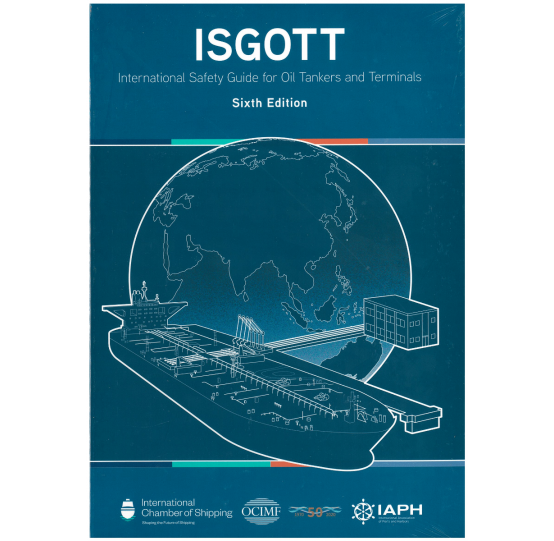ISGOTT International Safety Guide for Oil Tankers and Terminals
This sixth edition has been updated by OCIMF and ICS together with the International Association of Ports and Harbors (IAPH). Support has also been provided by other industry associations including INTERTANKO, the Society of International Gas Tanker and Terminal Operators (SIGTTO) and the Society for Gas as a Marine Fuel (SGMF).
The book covers a range of topical issues including gas detection, the toxicity and toxic effects of petroleum products (including benzene and hydrogen sulphide), the generation of static electricity and stray currents, fire protection and the growing use of mobile electronic technology. Many areas of the book have been reappraised and new topics, such as cyber security, have been added.
The Ship/Shore Safety and Bunkering Operations Checklists have also been revised to reflect changes in the understanding of the impact of human factors on their effective use. The layout of the book has been significantly improved to make it easier to navigate, with the addition of coloured sections and tabs. The text is supported throughout with new and updated illustrations.
ICS
The International Chamber of Shipping (ICS) is the principal international trade association for the shipping industry, representing shipowners and operators in all sectors and trades.
ICS membership comprises national shipowners' associations in Asia, Europe and the Americas whose member shipping companies operate over 80% of the world's merchant tonnage.
Established in 1921, ICS is concerned with all technical, legal, employment affairs and policy issues that may affect international shipping.
ICS represents shipowners with the various intergovernmental regulatory bodies that impact on shipping, including the International Maritime Organization.
ICS also develops best practices and guidance, including a wide range of publications and free resources that are used by ship operators globally.
https://www.ics-shipping.org/about-ics/about-ics
OCIMF
The Oil Companies International Marine Forum (OCIMF) is a voluntary association of oil companies with an interest in the shipment and terminalling of crude oil, oil products, petrochemicals and gas. OCIMF focuses exclusively on preventing harm to people and the environment by promoting best practice in the design, construction and operation of tankers, barges and offshore vessels and their interfaces with terminals.
IAPH
Founded in 1955, the International Association of Ports and Harbors (IAPH) is a non-profit-making global alliance of 170 ports and 140 port-related organisations covering 90 countries. Its member ports handle more than 60 percent of global maritime trade and around 80 percent of world container traffic. IAPH has consultative NGO status with several United Nations agencies. In 2018, IAPH established the World Ports Sustainability Program (WPSP). Guided by the 17 UN Sustainable Development Goals, it aims to unite sustainability efforts of ports worldwide, encouraging international cooperation between all partners involved in the maritime supply chain. WPSP (sustainableworldports.org) covers five main areas of collaboration: energy transition, resilient infrastructure, safety and security, community outreach and governance.
International Chamber of Shipping, OCIMF & IAPH.


